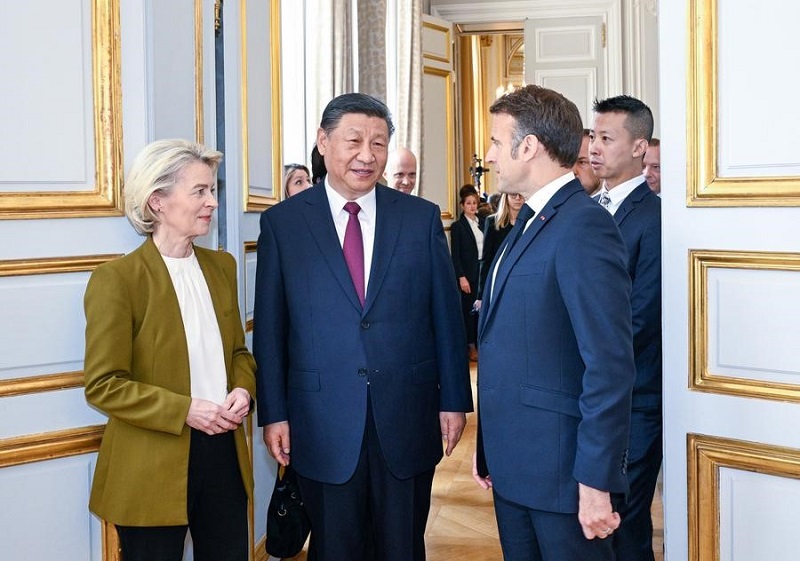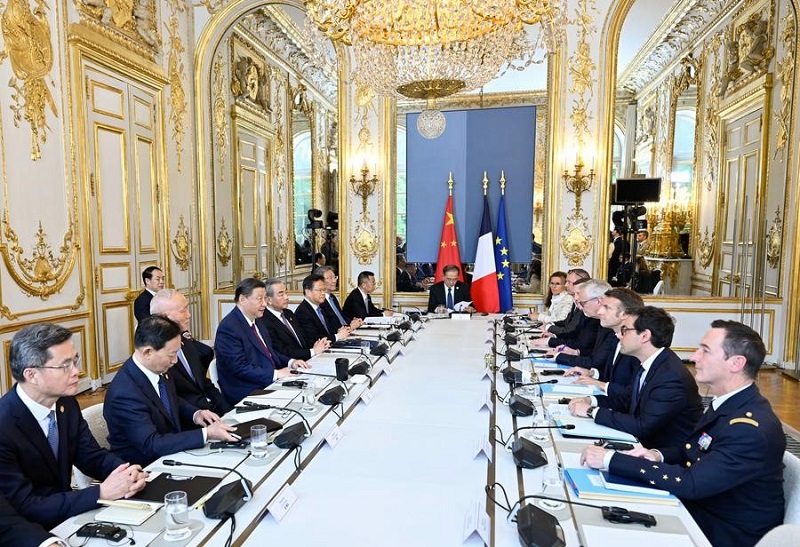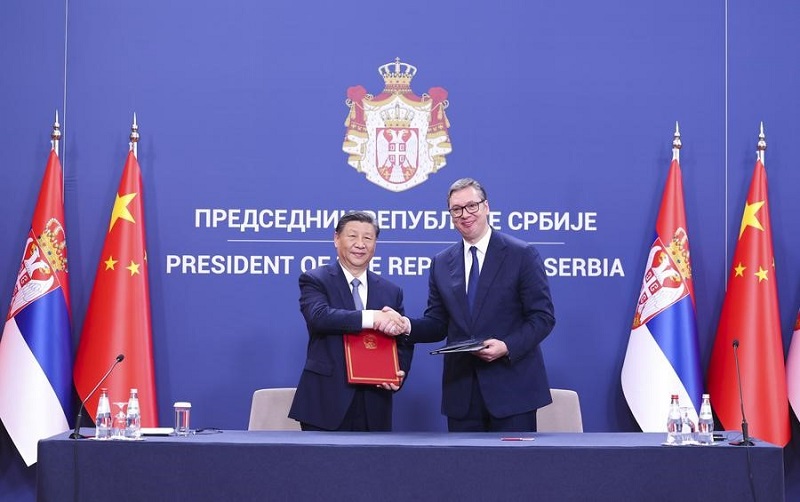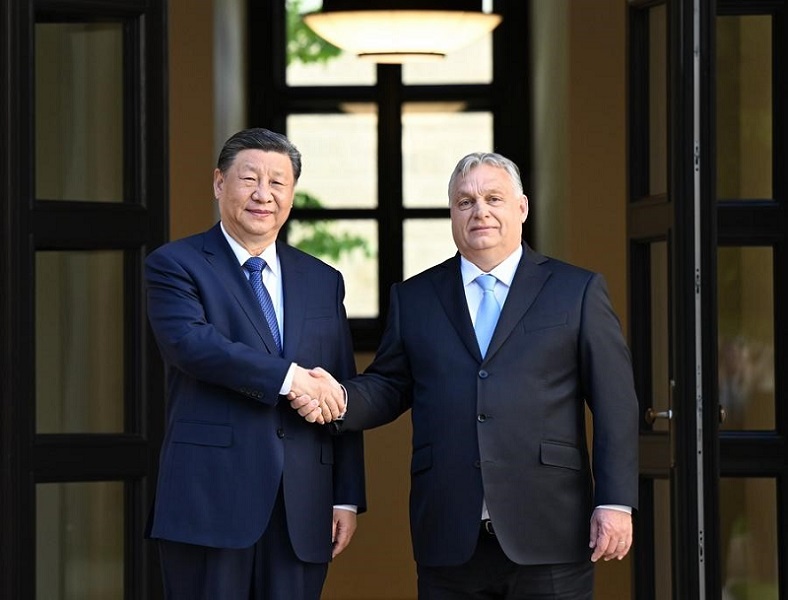President Xi Jinping’s European trip has strengthened China-EU ties amid protectionism and geopolitical tensions.

Chinese President Xi Jinping attends a China-France-EU trilateral meeting with French President Emmanuel Macron and European Commission President Ursula von der Leyen at Elysee Palace, in Paris, France, May 6, 2024. (Xinhua)
From May 5 to 10, Chinese President Xi Jinping paid state visits to France, Serbia, and Hungary. His first European trip in about five years, it consolidated China’s relationships with the three countries and Europe as a whole. The four states looked back on the history of their friendships, signed multiple cooperation agreements, and reached a consensus on promoting stable and sound development of China-EU relations.
Great Minds Think Alike
Upon his arrival in Paris on May 5, President Xi Jinping received a warm welcome in Chinese from Gabriel Attal, France’s youngest ever modern prime minister. This marked President Xi’s third state visit to France. It was six decades ago that the then-French President Charles de Gaulle decided to establish diplomatic relations with China, thus making France the first major Western country to do so. “In the 60 years since, our bilateral relations have always stayed abreast of China’s relations with Western countries, setting a prime example for countries with different social systems to coexist in peace and pursue win-win cooperation,” President Xi said.
In 2023, bilateral trade volume reached US $78.9 billion, nearly 800 times that of six decades ago. Total two-way investment also exceeded US $26 billion. China is now France’s biggest trading partner outside the EU, and France’s role as China’s trade partner remains crucial for China.
On May 6, President Xi Jinping attended the closing ceremony of the sixth meeting of the China-France Business Council with French President Emmanuel Macron, and delivered an important speech. “As one of the earliest participants in China’s reform and opening-up, France has contributed to China’s modernization drive and benefited from it,” President Xi said at the event. “We always view France as a priority and trustworthy partner of cooperation. We are committed to expanding our business relations in both width and depth by opening up new areas, creating new models, and fostering new growth areas.”
President Xi’s speech received a warm response from the French business community. Guillaume Faury, CEO of Airbus, said that Airbus values its partnership with China and will continue to honor its commitments, consistently invest in the Chinese market, and enhance cooperation in innovation with Chinese partners, while Sabrina Soussan, Chairman and CEO of Suez, said that “President Xi Jinping's speech was inspiring. There is great potential for cooperation between France and China in key areas such as environmental protection, renewable energy, and digital transformation,” according to Xinhua.

Chinese President Xi Jinping and his wife Peng Liyuan communicate with French President Emmanuel Macron and his wife Brigitte Macron at the Col du Tourmalet in Hautes-Pyrenees Department of France, May 7, 2024. (Xinhua)
President Macron and President Xi enjoyed the performance, in Songyuan, Guangzhou, in South China’s Guangdong Province, during the French president’s visit to China in April 2023, of a thousand-year-old melody titled High Mountains and Flowing Water. Representing a cherished friendship in Chinese culture, the melody may hence be interpreted as a wish for close friendship between China and France.
Macron recalled the deep and lasting impression that the meeting in Songyuan left on him on May 7, when he and his wife received President Xi Jinping and his wife in Tarbes, Hautes-Pyrenees Department of France, home of Macron’s late maternal grandmother. There they watched local villagers perform the shepherd’s dance unique to southern France, and discussed important issues while enjoying local delicacies in the snowy mountains. This informal meeting, signature of their mutual visits, enabled the two presidents to engage in discussions of great depth.
President Xi said at this meeting, “Although the Chinese and French civilizations, one in the East and the other in the West, have different values and social systems, both are committed to inter-civilization exchanges and mutual learning.” China and France should reserve differences while seeking common ground, like close friends, Xi noted.
France’s decision to establish diplomatic relations with China amid the divided and volatile ethos of the Cold War testifies to that country’s spirit of independence. Such a spirit especially relevant today, as the U.S., rallying its Western allies, tries to contain China’s development out of geopolitical considerations. France’s strategic autonomy merits commendation, in light of the biased stance of many countries due to being in the thrall of the U.S. As French writer Romain Rolland once said, “It is so much easier to allow oneself to be guided than it is to think for oneself. This abdication is the kernel of the mischief.”

Chinese President Xi Jinping and his French counterpart, Emmanuel Macron, hold talks at Elysee Palace, in Paris, France, May 6, 2024. (Xinhua)
Closer than Ever
Upon concluding his visit to France, President Xi Jinping made his second ever visit to Serbia on the evening of May 7 — a date that marks the 25th anniversary of the NATO bombing of the Chinese embassy in Yugoslavia that killed three Chinese journalists.
President Xi wrote in an article published in local media: “The Chinese people cherish peace, but we will never allow such tragic history to repeat itself. The China-Serbia friendship, forged with the blood of our compatriots, will stay in the shared memory of the Chinese and Serbian peoples, and will inspire us to march forward with big strides.” The incident has heightened the empathy between China and Serbia.
China and Serbia are ironclad friends who have unfailingly helped each other in times of need. After the 2008 earthquake in Sichuan Province’s Wenchuan, Serbia immediately came to China’s aid by donating needed supplies. The assistance that China gave to Serbia during the COVID-19 pandemic included sending protective equipment and medical instruments, as well as a group of medical experts. In 2016, the two countries established a comprehensive strategic partnership, the first such relationship in Central and Eastern Europe.
A notable example of China-Serbia cooperation is that of the Smederevo Steel Plant, which due to fierce market competition and serious management problems was verging on bankruptcy. In April 2016, HBIS Group, one of China’s largest steelmakers, acquired the plant and renamed it HBIS Serbia. The concern rapidly turned a profit, and in 2018 became the country’s largest exporter.
On April 29, 2024, President Xi replied to a letter from Serbian workers in HBIS Serbia’s Smederevo Steel Plant, saying, “The sound development of the plant is a striking epitome of high-quality Belt and Road cooperation between China and Serbia, as well as a paradigm of their mutually beneficial cooperation. The steelworkers are participants, witnesses, contributors to and beneficiaries of China-Serbia friendly cooperation.”
During this visit, President Xi presented Serbian President Aleksandar Vucic with replicated metal models made from the steel produced by HBIS Smederevo Steel Plant — gifts signifying that the bilateral friendship is as strong as that steel. President Xi told his Serbian counterpart, “We are steel-clad friends now, which is even closer than ironclad friendship.” The two presidents announced the building in the new era of a China-Serbia community with a shared future, the first of its kind in Europe, so opening up a new chapter in the history of bilateral relations.

Chinese President Xi Jinping and Serbian President Aleksandar Vucic sign a joint statement on the building of a China-Serbia community with a shared future in the new era, after their talks in Belgrade, Serbia, on May 8, 2024. (Xinhua)
On the evening of May 8, President Xi arrived in Hungary, the last stop on his European trip. Upon landing in Budapest, the country’s capital city, President Xi was presented with a bouquet of flowers by a young Hungarian woman called Olah Tamara. This was the same girl who had presented him with flowers 15 years ago, when he was Chinese vice president. President Xi recalled that moment the next day, when he met Hungarian President Tamas Sulyok, saying, “From a little girl to a beautiful young lady, doesn’t this symbolize the development of friendship between China and Hungary?”
Like Serbia, Hungary is also a close friend of China in Europe, and was one of the first countries to establish diplomatic relations with China in 1949. This year marks the 75th anniversary of diplomatic ties between China and Hungary. President Xi wrote during the state visit he paid to the country that the relationship between China and Hungary “is at its best in history, and has embarked on a golden voyage.” The two countries announced during this visit the elevation of their bilateral relationships to an all-weather comprehensive strategic partnership for the new era that promotes bilateral relations and practical cooperation to an even higher level.
Hungary was the first European country to sign a Belt and Road cooperation document with China. The country is also China’s top investment destination, and its important trading partner in Central and Eastern Europe. Several leading Chinese new energy vehicle businesses, including BYD and CATL, have invested in Hungary and opened factories there. The construction of the Hungary-Serbia railway, a flagship project of the Belt and Road Initiative (BRI), has continued steadily to advance.
Hungary is a member of the EU, and has supported China in such China-related issues as the Taiwan question. In a meeting with Prime Minister Orban, President Xi expressed the hope that “Hungary will take the opportunity of assuming the rotating presidency of the European Union (EU) in the second half of this year to promote steady and sound development of China-EU relations.”
China’s close relations with Serbia and Hungary have shown other European countries that China is a friend, not a foe, and cooperation with China promises peace and prosperity. As Balazs Orban, political director of Hungarian Prime Minister Viktor Orban, told Xinhua, “For us, China is not a threat, but an opportunity.”

Chinese President Xi Jinping holds talks with Hungarian Prime Minister Viktor Orban in Budapest, Hungary, May 9, 2024. (Xinhua)
Moving China-Europe Relations Forward
President Xi’s European trip both improved China’s relations with the three countries and demonstrated that countries with different systems and cultures can work together. The EU sees China as a partner for cooperation, an economic competitor, and a systemic rival. In recent years it has stressed the role of “a systemic rival” and even sought to “de-risk” from China. President Xi voiced his hope on May 6, during the China-France-EU Trilateral Leaders’ Meeting with French President Emmanuel Macron and European Commission President Ursula von der Leyen, that “the EU institutions will develop the right perception of China and adopt a positive China policy.”
A correct perception of China is the starting point for strengthening bilateral relations that enable both sides to flourish. Tian Dewen, deputy director of the Institute of European Studies of the Chinese Academy of Social Sciences, told Global Times that China-EU relations have encountered difficulties in the past five years, but that China-France relations have been relatively stable, which relates directly to the Macron government’s implementation of positive and pragmatic relations with China. Europe’s strategic autonomy, championed by France, deserves other European countries’ serious consideration in regard to the handling of their relations with China.
Strengthening bilateral relations also requires proper management of the economic and trade frictions occurring between China and the EU in recent years. For example, under the flag of protectionism, the EU published a notice of initiation of EU anti-subsidy investigations into the imports of battery electric vehicles (BEVs) from China, and wrongfully accused China of overcapacity.
President Xi personally addressed the EU’s concerns, suggesting that China’s new energy industry has made real progress in open competition and represents advanced production capacity. In addition to increasing global supply and alleviating the pressure of global inflation, it contributes significantly to global climate response and green transition. The so-called “problem of China’s overcapacity,” therefore, does not exist, either from the perspective of comparative advantage or in light of global demand.
As China and the EU are each other’s second largest trading partners, the conflicts between the two sides regarding economic and trade issues should not present any obstacle to win-win cooperation. President Xi told Macron and von der Leyen that China and the EU “have extensive common interests and broad space for cooperation in the green and digital transition. It is necessary that we properly address economic and trade frictions through dialogue and consultation and accommodate each other’s legitimate concerns.”
Additionally, in an interview with the Economist prior to President Xi’s visit, President Macron said that China is crucial when it comes to major questions in regard to the planet, like climate and biodiversity. He concluded, “There will be no progress on climate and biodiversity if there is no agreement with the Chinese on these issues.” The French president believes that Europe’s role is to do everything it can to facilitate a consensus on these major climate and biodiversity issues.
Despite their differences in political systems and cultural traditions, facts have shown that it’s in the interests of China and the EU as well as the whole world to work together and crack the common challenges.